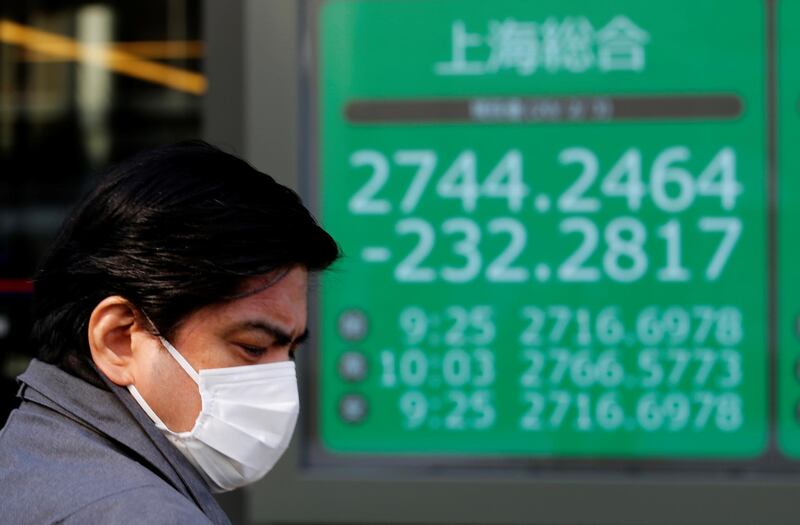Chinese stock and commodity markets fell sharply on Monday as the death toll from a coronavirus epidemic in China rose to 361 and investors retreated into safe-haven assets in the first trading session after an extended Lunar New Year break.
Markets plunged at the open in their first session since January 23, when the outbreak of the newly identified virus had claimed only 17 lives in Wuhan city, the centre of the outbreak, in Hubei province.
Since then, the flu-like virus has been declared a global emergency and spread to more than two dozen other countries and regions, with the first death outside of China reported on Sunday, that of a 44-year-old Chinese man who died in the Philippines after travelling from Wuhan.
The number of deaths in China rose to 361 as of Sunday, up 57 from the previous day, the National Health Commission said. The number of new confirmed infections in China rose by 2,829, bringing the total to 17,205.
The Shanghai Composite index shed 8 per cent to hit one-year low on Monday, wiping almost $370 billion (Dh1.36 trillion) off the market value, according to Reuters calculations.
The yuan began trade onshore at its weakest level this year. Iron, oil and copper traded in Shanghai all dropped by their daily limits, catching up with global price falls as the spread of the virus weighed on the world's growth outlook.
Investors were bracing for volatility when onshore trade in Chinese stocks, bonds, yuan and commodities resumed, following a steep global sell-down on fears about the effect the virus will have on the world's second-biggest economy.
Looking to head off panic, China's central bank injected 1.2tr yuan of liquidity into the markets via reverse repo operations.
Beijing also said it would help firms that produce vital goods resume work as soon as possible, the state broadcaster CCTV reported.
China's Sinopec, Asia's largest refiner, said it would cut refinery output this month by about 600,000 barrels per day, roughly 12 per cent of the average daily output last year, as health worries hit fuel demand, according to sources.
But while stock markets reopened, most provinces extended the Lunar New Year holiday to try to contain the virus, with workers in Hubei not scheduled to return to work until after February 13.
Cities like Wuhan remain in virtual lockdown with travel severely restricted, and China is facing mounting international isolation as well because of restrictions on flights to and from the country.
At least another 171 cases have been reported in more than two dozen other countries and regions, including the United States, Japan, Thailand, Hong Kong and Britain.
The World Health Organisation declared the outbreak a public health emergency of international concern but said global trade and travel restrictions are not needed.







